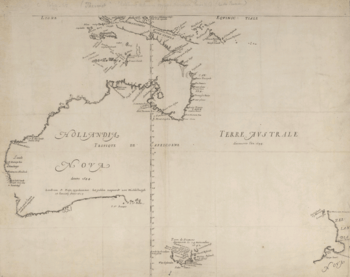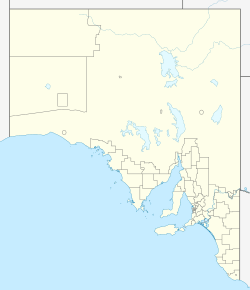St Peter Island (South Australia) facts for kids

The island appears on this 1644 map as "I St. Pierre"
|
|
| Geography | |
|---|---|
| Location | Great Australian Bight |
| Coordinates | 32°17′S 133°34′E / 32.283°S 133.567°E |
| Archipelago | Nuyts Archipelago |
| Administration | |
|
Australia
|
|
St Peter Island is a cool island located in the Nuyts Archipelago. You can find it off the west coast of the Eyre Peninsula in South Australia, close to the town of Ceduna. It's a pretty big island, stretching about 13 kilometers (8 miles) long. In fact, it's the second largest island in all of South Australia!
St Peter Island was one of the very first places in South Australia that Europeans explored and named. This happened way back in 1627. A Dutch explorer named François Thijssen mapped it from his ship, the [t Gulden Zeepaert]. He named it Eyland St. Pierre.
Contents
Island History
Early Activities on St Peter Island
In the 1820s and 1830s, people came to St Peter Island for seal hunting. They would hunt seals for their fur and oil. Scientists have also found bones from whales on the island. This shows that whaling might have happened there too.
The places where these activities took place are very important. They are called the St Peter Island Whaling Sites. These sites are listed on the South Australian Heritage Register. This means they are protected because they teach us about the past.
Protecting St Peter Island
Special Protected Areas
St Peter Island is part of a special protected area. It is inside the Nuyts Archipelago Conservation Park. This park helps to protect the land and its animals. The waters around the island are also protected. They are part of the Nuyts Archipelago Marine Park. This marine park helps keep the ocean life safe.
Important Bird Area
St Peter Island is also known as an Important Bird Area (IBA). BirdLife International, a group that protects birds, gave it this title. Why is it so important for birds? Because many different kinds of birds live and breed here.
Birds of St Peter Island
The island is home to huge numbers of certain bird species. More than 1% of the world's population of short-tailed shearwaters live here. You can also find many white-faced storm-petrels and pied oystercatchers. These birds rely on the island for their homes and to raise their young.
The island is also near another important bird area. This is the Tourville and Murat Bays Important Bird Area. It is just west of Ceduna on the mainland.
 | Anna J. Cooper |
 | Mary McLeod Bethune |
 | Lillie Mae Bradford |


